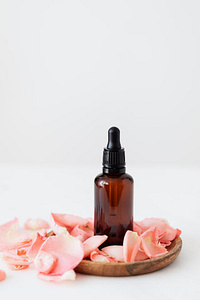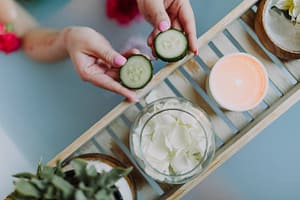Do you know that feeling when you try a new skincare product, and within seconds, your skin feels like it’s on fire? Ugh, I’ve had that far too many times. Over 60% of people report having sensitive skin; it seems like more of us are joining that club daily. Whether it’s stress, environmental factors, or just bad luck, sensitive skin can turn what should be a simple skincare routine into a tricky puzzle. That’s why exploring natural skincare for sensitive skin can be a lifesaver.
After years of wasting money on products that claimed to be “gentle” but only made things worse, I finally discovered the beauty of natural skincare. Honestly, it’s been a game-changer for both my skin and my sanity. Not only are these solutions less harsh, but they’re also much more affordable. Plus, I love the idea of knowing exactly what’s going onto my skin.
Key Ingredients for Sensitive Skin
Let me start by sharing some of the natural ingredients that have totally transformed my skincare routine. Each one of these is gentle enough for sensitive skin but still packs a serious punch.
Calendula for Calming Inflammation
Calendula was one of those things I discovered when I was desperate to calm a persistent red patch on my cheek. Nothing worked—until I stumbled upon calendula. It’s a plant with some serious anti-inflammatory powers. After just a few days of using calendula-infused oil, the redness started to fade. Now, I always keep a little bottle of it around. Whether it’s in a cream or an oil, it works wonders.
Jojoba Oil for Skin Barrier Repair
Jojoba oil is technically not even an oil—it’s a liquid wax that’s nearly identical to the natural oils our skin produces, essentially sebum. It’s seriously perfect for sensitive skin because it helps balance oil production without clogging pores. I started using it every night as a moisturizer, and my skin has never been happier. Bonus: It doesn’t cause breakouts, which is a miracle in itself!
Rosehip Oil for Regeneration
I remember being super hesitant about using oil on my already finicky skin, but rosehip oil is something special. It’s packed with vitamins A and C, which help regenerate skin and soothe any irritation. A word of caution though: store it in a dark bottle because it can go bad quickly if exposed to too much sunlight (learned that one the hard way).
DIY Face Masks for Natural Skincare in Sensitive Skin
Making your own face masks is not only fun but also lets you control what’s going on your skin, especially when focusing on natural skincare for sensitive skin. Over the years, I’ve tried a lot of different combinations, and these are the ones that actually work.
Oatmeal and Honey Mask for Instant Relief
This mask is my absolute go-to when my skin is feeling super irritated. Oatmeal is so calming, and honey is hydrating and naturally antibacterial. Just make sure you grind the oatmeal into a fine powder—I once used regular oats, and it took forever to wash off. Here’s what I do:
- 2 tablespoons of finely ground oatmeal
- 1 tablespoon of raw honey
- 1 teaspoon of cooled chamomile tea
Mix it all together, slather it on your face, and leave it for about 15 minutes. Your skin will thank you!
Avocado and Banana Mask for Deep Hydration
This one might sound a little weird, but it’s amazing for dry, sensitive skin. Mash half an avocado with half a banana, and then add a teaspoon of jojoba oil. Avocado is loaded with fatty acids that hydrate the skin, and banana provides a gentle exfoliation. This mask is a lifesaver in the winter when my skin gets super dry.
For more skin care tips for women over 40, read our other articles on skin changes and nutrition and skin changes and stress.
Gentle Cleansers You Can Make at Home
If you’ve got sensitive skin, you know how important it is to find a cleanser that doesn’t strip your skin of all its natural oils. These DIY cleansers are gentle and easy to make at home.
Coconut Oil Cleanser for Deep Hydration
Coconut oil might not work for everyone, but I love how it gently removes makeup without drying out my skin, making it a staple in my natural skincare for sensitive skin routine. I warm up a tablespoon of coconut oil between my hands and massage it into my skin. After a minute, I wipe it off with a warm, damp cloth. Simple, effective, and hydrating.
Just be careful: Coconut oil can clog pores for some people, so definitely do a patch test first.
Aloe Vera and Cucumber Cleanser for Soothing Refreshment
This is my go-to cleanser during the summer. It’s light, refreshing, and incredibly soothing. I blend two tablespoons of aloe vera gel with half a peeled cucumber. It leaves my skin feeling clean without that tight, dry feeling.
DIY Moisturizers for Sensitive Skin
Moisturizing is crucial, especially for sensitive skin. I’ve experimented with a lot of DIY moisturizers, and these are by far my favorites.
Shea Butter and Calendula Balm for Deep Nourishment
If your skin is extra dry or irritated, this balm is like a drink of water for your face. Melt two tablespoons of shea butter, stir in one tablespoon of calendula oil, and let it cool. This balm feels super luxurious, and it’s great for calming down inflamed skin.
Aloe Vera and Jojoba Oil Moisturizer for Lightweight Hydration
For something a bit lighter, I mix two tablespoons of aloe vera gel with a teaspoon of jojoba oil. This moisturizer absorbs quickly and doesn’t feel greasy, making it perfect for everyday use.
Patch Testing: Essential for Sensitive Skin
One thing I can’t emphasize enough—always patch test before trying out a new DIY skincare product, even if it’s all-natural. Some people might be allergic to things like calendula or coconut oil, even though they’re gentle for most. Test any new product on a small area, like your wrist, and wait 24 hours to see how your skin reacts. It’s a simple step that can save you from unwanted flare-ups.
Common DIY Skincare Mistakes to Avoid
As amazing as DIY skincare is, there are some common mistakes you want to avoid:
- Over-exfoliating: Even natural exfoliants like sugar can be too harsh for sensitive skin, causing redness and irritation.
- Using essential oils undiluted: Oils like tea tree can be great for spot treatments, but always mix them with a carrier oil to prevent burns or irritation.
- Not patch testing: As mentioned earlier, patch testing is essential to ensure you don’t have any reactions to your DIY creations.
Sun Protection and Natural Skincare for Sensitive Skin
Sensitive skin needs sun protection just as much as it needs hydration and gentle care. Mineral sunscreens with zinc oxide are ideal because they provide physical protection without irritating the skin. Make sure to reapply regularly, even if you’re using natural sunscreen. And remember—coconut oil alone does not provide adequate sun protection, Verywell Health.
Building a Natural Skincare Routine for Sensitive Skin
Switching to a natural skincare routine for sensitive skin can make all the difference. The key is to focus on gentle, nourishing ingredients like calendula, jojoba oil, and rosehip oil. Whether you’re whipping up a DIY face mask or blending a homemade moisturizer, the control you gain over your routine is worth it.
Remember to patch-test any new ingredient before slathering it all over your face—trust me, it’s worth the extra step. By keeping things simple and sticking to natural ingredients, you’ll be able to build a routine that works for you.
For more skin care tips for women over 40, read our other articles on skin changes and nutrition and skin changes and stress.



